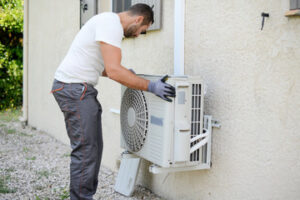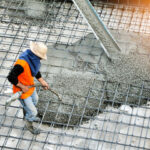Home » Articles posted by Felipe Dobson
Author Archives: Felipe Dobson
The Importance of Concrete Contractors
Concrete Contractors Greensboro NC are specialized tradespeople who work on a variety of construction projects. They have extensive hands-on experience with pouring, finishing, and repairing concrete structures.

They also possess technical expertise and knowledge of building codes, regulations, and industry standards. They stay updated on innovative techniques and offer clients creative solutions for their unique project requirements.
Concrete is the most versatile construction material on the market. It can be used in a wide variety of applications, and professional concrete contractors are crucial for the safety, integrity, and beauty of any concrete project. Concrete contractors are more than just pouring cement; they’re experts in transforming construction visions into tangible realities. They are passionate about their craft and have a dedication to quality that goes beyond just building structures.
The concrete industry is not only a powerful business, but also a fun and exciting one. Contractors love what they do and are proud to share their knowledge with others in the industry. They aren’t afraid to step outside the box and try new methods, materials, and tools to improve their work. They also enjoy collaborating with clients and forming lasting relationships in the process.
Contractors are no stranger to the spotlight either, with a number of television shows featuring them. Many people grew up watching Norm Abram build masterpieces on This Old House or tagged along as the This Week at Home crew solved plumbing, landscaping, and electrical problems for homeowners. The more recent Concrete Combat is a fantastic show that celebrates concrete professionals and fills a gap in media representation of the trades.
A passion for the craft of concrete is at the core of every Baker Concrete project, too. Their commitment to quality, customization, and architecture enables them to transform environments that inspire. The team at Baker Concrete takes pride in bringing their clients’ dreams to life, and they do it by prioritizing precision and craftsmanship. This dedication extends far beyond the job site as Baker Concrete has a strong philanthropic focus on the community.
Expertise in Working with Concrete Materials
A passion for concrete and a strong desire to create durable and visually appealing structures are fundamental qualities that underpin the success of commercial concrete contractors. They have a deep understanding of the concrete materials used in their work and are familiar with all applicable building codes and regulations. In addition, they are able to work with architects and engineers to ensure that the final product meets design specifications and is built to last.
When choosing a concrete contractor, it’s important to clearly define your project requirements and budget. A good contractor will be able to provide you with a detailed breakdown of costs including labor, materials, permits, and other expenses. They should also be able to give you an accurate estimate of how long the project will take and any potential issues that may arise.
Look for a concrete contractor who has a solid track record of completing projects on time and within budget. Ask for a portfolio of their past works and pay close attention to the quality of finish, precision in construction, and overall aesthetics. You can also check out some of their previous projects in person or request a list of references that you can contact to learn more about their work and experience.
It’s also a good idea to verify the contractor’s credentials and insurance coverage before hiring them. Licensed contractors have met all the necessary requirements to operate legally, while insurance covers any accidents or damage that might occur during the course of the work. Some concrete contractors also hold certifications from material suppliers that demonstrate their expertise and familiarity with specific types of products or installation techniques.
Finally, look for a concrete contractor who offers warranties and guarantees on their work. This is an excellent way to protect your investment and ensure that the finished project will be free from any defects or problems that might arise after it’s completed. This is particularly important if you’re investing in a large-scale project that will be used for business purposes. Choosing a reputable concrete contractor that stands behind their work is a smart move that can save you money in the long run by preventing costly repairs and replacements.
Experience
Concrete professionals have extensive industry experience, often garnered from hundreds or even thousands of past projects. This means they have an in-depth understanding of the best strategies to complete your project correctly and efficiently. They also have the knowledge to anticipate potential challenges, and they can quickly find solutions to overcome obstacles. This allows them to meet project deadlines without sacrificing quality or safety.
Ask a potential commercial concrete contractor to provide you with a portfolio of projects completed in the past. Examine their work carefully to assess the craftsmanship, attention to detail, and overall aesthetics. Pay special attention to projects that are similar to yours, as these can help you determine their capabilities and the level of expertise they offer.
Look for a concrete contractor that offers a warranty on their services. A warranty shows that they have confidence in their abilities and are willing to stand by their work. It’s also a sign of their commitment to customer satisfaction and to addressing any issues that may arise after the completion of a project.
When evaluating potential concrete contractors, make sure they have the proper licensing and certifications. In addition, be sure they are insured and carry workers’ compensation insurance in case of any injuries or property damage on the job site. You should also inquire about their safety practices, and ensure they adhere to all local building codes and regulations.
An experienced commercial concrete contractor will have a strong working relationship with architects, engineers, and other construction professionals. This teamwork is essential to the success of your project. They can help you create a design that meets your specifications and works within your budget. They can also advise you on the best materials and techniques to use, ensuring that your finished product is safe and durable. Their expert advice can save you time and money on the long run. Lastly, their knowledge of local building codes and regulations can help you avoid costly fines. They can also navigate the complex permit process with ease. This is a major benefit, as it can reduce the amount of time you spend waiting for approval from the city.
Commitment to Quality and Safety
Concrete contractors must understand the importance of building with quality in mind. This is why they carefully select the raw materials needed to make sure that the end result meets industry standards and will last a long time.
In addition, a reliable contractor always takes safety into consideration and complies with all relevant regulations. They are also accountable for their mistakes and will always find a way to resolve them properly. This shows that they are truly invested in their work and take pride in delivering high-quality results on all of their projects.
Choosing the right commercial concrete contractor is a crucial decision that affects the overall project success. Look for a contractor with proper licensing and certification, a diverse portfolio of past projects, and a commitment to transparent communication and accurate cost estimates.
When evaluating potential contractors, be sure to review their online reviews and testimonials. This will give you an idea of what past clients have experienced with them. It is also a good idea to ask them about their safety policies and procedures in case you plan on working with them for a commercial project.
In addition to these qualities, an exceptional contractor should be able to provide clear explanations and professional advice throughout construction. This will help you to understand the processes involved and how they will impact your construction schedule. They should also be able to identify any issues that may arise and offer solutions before they escalate into costly delays and rework.
Streamline your construction process with Construsoft’s smart software. With an accurate and information-rich 3D BIM model, you can reduce risks, save on costs, and deliver a more successful project. With streamlined planning and precise quantity take-offs, you can get the job done quickly and efficiently without sacrificing quality.
Concrete projects are complex and involve multiple steps. They require the careful selection of materials and a detailed understanding of construction methods to ensure that the final product is safe, durable, and meets all relevant specifications. That’s why it is important to choose a concrete contractor who has the knowledge and experience necessary to complete your project on time and within budget.
How Your HVAC System Heats and Cools Your Home
The hvac that heats and cools your home works by moving air from the outside into your house. A blower, an air filter and ductwork help facilitate this movement.

A home’s HVAC system also helps remove moisture, smoke, dust, bacteria, odors and carbon dioxide from conditioned air that circulates throughout the house. Contact Ausco Air Heating & Air Conditioning for professional help.
Heat pumps are all about transferring renewable energy from the air, ground or water and delivering it to your home as heating and cooling. The basic process is similar to the one used by refrigerators: Liquid refrigerant in a coil absorbs heat from the air (even at freezing temperatures), and electricity powers a compressor that squeezes the liquid, making it really hot. This heat is then pumped into a second coil, where it’s heated by a fan blowing over it, and a warm air stream is pushed into the home. The refrigerant then cools back to a liquid, and the cycle repeats.
In winter, heat pumps run in reverse, absorbing the heat energy from the air outside your home (even at subfreezing temperatures) and transferring it inside. This process can cut your energy use for heating by up to 50% compared to electric resistance systems like baseboard heaters or furnaces.
There are several different types of heat pump, including ductless options that offer easier installation in homes with no existing ductwork. Ductless heat pumps also allow you to control the temperature in each room of the house with individual head units. Regardless of the type of heat pump you choose, it’s important to have your system regularly maintained by an MSC heating engineer.
As a rule of thumb, we recommend having your heat pump serviced in the summer, just as you’d have your air conditioner serviced. This will ensure that the refrigerant is in a safe and working condition and ready to perform its best when it’s time to heat your home.
As the world moves toward lower-carbon energy sources, heat pumps are becoming increasingly popular, especially in colder climates. They’ve been shown to shrink carbon emissions from space heating — even when they run on electricity that is produced partly by fossil fuels. As a result, many homeowners are saving hundreds of dollars every year by switching to heat pumps. And they’re even eligible for big government rebates! To find out if a heat pump is right for you, schedule an appointment with your local Trane comfort specialist. They’ll be familiar with the climate in your area and your home’s layout, insulation and other factors to recommend a customized solution based on your specific needs.
Furnaces
Furnaces warm air, and a blower fan sends it to ductwork for distribution throughout your home. They can be powered by electricity, natural gas, oil or propane. Furnaces are one of the oldest types of heating systems still in use today. There are many different kinds of furnaces, all with unique characteristics, costs and efficiency ratings. Some are single-stage, others are two-stage, and some operate at variable speed. The kind you choose depends on a few factors.
First, consider what your specific indoor comfort needs are. Do you have humidity problems? Do you have hot or cold spots in your house? Then think about your budget. A new furnace can be expensive, so it’s important to understand the costs involved before making any decisions.
Most of us know that our furnaces create heat and distribute it via ductwork and vents, but how do they actually work? Understanding the process can help you troubleshoot problems and even prevent costly emergency services calls or furnace replacement.
In a standard, single-stage gas furnace, the burner ignites the gas and heats it up to the temperature set by the thermostat. The heat rises up through the combustion chamber and into the heat exchanger where it’s transferred to the incoming air, warming it. When the thermostat senses the room temperature has reached the desired temperature, it turns off the burner and shuts off the gas valve.
To avoid overheating, the heat exchanger has a flame detector that signals when it’s too hot and opens the gas valve to shut off the flow of fuel. The system also has a blower fan and a plenum that carries return and supply air. The blower draws the cooler air from return vents, blows it past the heat exchanger and forces warmed air into the home’s ducting.
If the heat exchanger cracks, carbon monoxide leaks into the ducting and circulates in your home, causing health issues and possibly death. To prevent this, it’s important to regularly replace the air filter and use a more airflow-friendly (higher MPR) vent cover and duct tape. You can also reduce blockages by ensuring the return and supply vents are open, using a high-efficiency blower, reducing the load on the system with smaller rooms and adding insulation to the ductwork.
Air Conditioners
Air conditioning systems work by cooling the air inside your home or business using a coil filled with a refrigerant. They then blow that cool air through a system of ducts in the walls and floors. If the cooling system becomes too warm, it will reject that heat to the outside air through a big fan in the outdoor unit. That air also has the benefit of absorbing the sun’s rays, causing them to lose their heating potential.
In 1933, Willis Carrier developed a belt-driven compressor, blower and mechanical controls that would become the standard in modern cooling technology. While today’s air conditioners operate on the same basic principles as Carrier’s design, they have improved significantly in terms of vapor compression and refrigeration cycle efficiency.
Today’s AC units typically run on either electricity or gas. Gas units operate differently than electric ones, but they offer an effective and efficient alternative to traditional oil furnaces. Most homeowners choose to combine their air conditioning setup with a gas furnace for complete HVAC solutions.
Unlike smaller room air conditioners that plug into household outlets, larger systems require their own dedicated 115-volt electrical circuits to function properly. This allows them to operate without the risk of tripping the home’s main circuit breakers. In fact, some models even offer a built-in thermostat to help regulate energy consumption.
The most popular type of AC is a central AC system. These are made up of two components, a large metal cabinet outside the house that houses the compressor and condenser, and an indoor unit that contains the evaporator coil. This unit can be split into multiple units that are linked by pipes, or it can be a single package system that includes all of the equipment in one cabinet. Those with only one indoor unit are known as “mono-split” systems, while those with several indoor units are called “multi-split.”
During an Air Conditioning, Heating and Refrigeration Technology program at the ACC Career Center, students have hands on experience working on all of these different types of equipment. This gives them the knowledge and confidence to diagnose problems and perform repair services.
Ductwork
Ductwork is the system of air vents that deliver heated or cooled air to your home’s living spaces. This hidden network is an integral part of your HVAC system, regulating indoor temperatures and reducing energy bills by improving airflow. Poorly designed or maintained ductwork can create problems that lead to low indoor air quality, higher energy bills, and inefficient HVAC systems.
When it comes to ducting, there are various factors that determine how well your system works. For example, if your ducts are the wrong size, they may restrict airflow and cause your heater or air conditioner to work harder than it should. Fortunately, this is easy to fix. The solution involves having your ducts professionally sized by an HVAC technician. The HVAC technician will take various measurements, including square footage of your home, square footage of each room, cubic feet per minute, and friction loss.
In addition, the HVAC technician will look for a proper duct connection. There are several types of duct connections, such as slip joints, couplings, and flange connections. In the case of flange connections, a duct may be crimped and sealed with mastic sealant or HVAC metal tape to ensure that there are no leaks. Ideally, all connections are also made with duct insulation to prevent moisture issues, air leaking, and to reduce your heating or cooling costs.
The HVAC technician will also inspect and clean your ducts. For mildly dirty ducts, he or she may use a rotating brush to remove dust, debris, and other contaminants from the inside of your ductwork. For heavily clogged or dirty ducts, a power vacuum will be used. This involves inserting a large vacuum line into your ducts and pulling air out of them to clean the entire system.
In order to properly maintain your ductwork, you should survey it periodically for cracks and holes. These can cause a major increase in static pressure, which can make your blower fan work harder than it should. In addition, you should have your ducts cleaned at least every five years. This will prevent a build-up of allergens like pollen and dust that can negatively affect your health.
Security Guard, Security Manager, and Security Director Jobs
Security Guard Baltimore Maryland are responsible for patrolling their assigned areas, ensuring security cameras and alarms are working properly. They are also on hand to help employees gain badge access and escort them into and out of buildings.
Security guards must be able to handle emergency situations and follow protocols such as contacting police or notifying emergency services. They are also trained in conflict de-escalation techniques to diffuse tensions and disputes.

Security officers are the frontline members of a company’s security team. These individuals are armed with a range of security protocols and are able to handle emergency situations on their own or with the help of other personnel. They are able to respond to alarms, patrol facilities and buildings, and monitor access points to deter unauthorized individuals from entering. They also have the ability to detain and make a citizen’s arrest when necessary. In addition to these duties, they must remain aware of all relevant safety policies and laws in their jurisdiction.
Security guards are a key component of a business’s overall security operation, and they work closely with local police and fire services. They act as liaisons between businesses and their respective public safety departments, helping to ensure that everyone involved in a situation understands what is happening and how it should be handled.
While they don’t have the same level of authority as a police officer, security guards are able to enforce rules that a business owner creates at his or her business or residence. These rules might include things like “no smoking” or “no loitering.” A security guard is a great choice for a business that would like to add these kinds of additional rules and to have someone who can enforce them fairly.
In many cases, a security guard will have a supervisor who oversees him or her. The supervisor is responsible for ensuring that all the duties and responsibilities of the security guards are met. This individual will also play a critical role in training new security guards, preparing them for the rigors of their jobs and making sure that the company’s security operations run smoothly.
Security supervisors are usually armed with the same level of training as a security guard and have the ability to perform all the same duties. They often have more administrative responsibilities, however, as they are responsible for the day-to-day running of a security department. They are also able to offer advice on a wide range of security issues and provide additional training for guards in their areas of expertise.
Security Supervisor
As a security supervisor, you oversee the work of other security guards. As a result, you must be comfortable with the various security protocols in place at your facility. You also need to understand how to effectively supervise and train the guards under your watch. Additionally, you must be able to log daily activities and respond to any security situation that occurs. You must also be able to handle administrative tasks like scheduling shifts, coordinating with other security personnel or directors at the company, and communicating with the police in case of an incident.
You must be familiar with security systems and equipment like alarms, CCTV and more. You are also responsible for ensuring that all guards you supervise follow protocol during their shifts. You must also know how to respond appropriately if an event occurs, which may include de-escalating conflict or responding to suspicious activity. This is a critical role for your business.
A security supervisor must inspect and brief all shifts before they start their duties, which should include a physical inspection of equipment as well as a discussion of what happened during the previous shift. You should also give new officers a quick overview of how to perform their assigned duties as well as any changes in procedures. This will help your security force function as a cohesive unit and serve your clientele.
It is also the responsibility of the security supervisor to ensure that all patrols are conducted properly, both indoor and outdoor. This could mean monitoring the behavior of clients and staff as they move throughout your facility as well as ensuring that all indoor areas are inspected thoroughly. In addition, a supervisor should conduct a thorough walkthrough of the building before the end of his or her shift, and also have a golf cart available to operate in case an area is too large to cover via walking.
If a security issue arises, the supervisor must act as the incident commander until additional command resources arrive. This means ensuring that all security personnel are prepared to deal with any issues and keeping abreast of local, state and federal policies, directives and laws that pertain to campus-related security.
Security Manager
A security manager is a higher up position within the industry and will supervise other guards. They will provide protection to a business but will also manage the day-to-day security processes of their clients. This is an ideal job for someone who has a high school diploma, athletic ability, and a strong desire to succeed in the security industry.
They will monitor all aspects of a company’s security, such as CCTV, alarm systems, and locks. They will also inspect all areas of a facility to detect any suspicious activity or criminal activity. They may even be tasked with patrolling industrial or commercial premises on foot or in a vehicle, as well as operating x-ray and metal detector equipment.
The manager will also ensure that all security personnel are properly trained and prepared to deal with any situation that might arise. They will work with local police and fire departments to ensure that all of the appropriate protocols are followed when an incident occurs. This is an important role, and one that should not be taken lightly.
In addition to supervising other security personnel, a security manager will also need to perform regular administrative duties such as writing reports, monitoring employee attendance, and preparing budgets. They will need to have excellent organizational skills and be able to work under pressure in hectic situations. In some cases, a security manager will be required to travel to different locations for work, so it is important that they have a valid passport and are not afraid of travelling.
If you’re looking to hire a security manager, it’s important that you write a detailed job description. This will help you attract the best candidates and ensure that you get the right person for the job. Start by listing all of the essential qualifications that you need, including any experience or certifications that are relevant. Then, you can include a list of additional qualifications that would be helpful but are not necessary for the role. Finally, include a brief explanation of the work schedule and any other responsibilities that might be pertinent to the role.
Security Director
A security director is a senior-level professional that manages the entire security department at an organization. They oversee all of the company’s safety programs, and develop and implement policies that promote a secure work environment for everyone who visits or works on the premises. Security directors also serve as mentors for security officers and other managers.
A day in the life of a security director can be extremely busy. Cyber criminals are always working to penetrate organizational systems and access sensitive information, so these professionals must be ready at all times. This often requires them to be on call around the clock, which means that they typically work more than 40 hours a week. In addition, planned system outages to perform cybersecurity upgrades are often scheduled during weekends and evenings.
Security director jobs require the right mix of skills to thrive. These individuals need leadership, team management, communication, and analytical abilities to lead their teams and encourage collaboration. They also need to be able to identify and resolve complex problems quickly.
Those interested in becoming security directors may start by taking courses that focus on computer and cybersecurity subjects to acquire the necessary knowledge. They can then begin to take on more responsibilities as they gain experience in the industry. Some of the top employers for these professionals include government agencies, IT and networking firms, banks, and large corporations that deal with a lot of customer data.
Modern organizations prioritize their security protocols to protect the privacy of their employees and customers. A security director spearheads these efforts by implementing and coordinating procedures to reduce risk, encrypt information, and ensure compliance. These professionals also collaborate with human resources departments to evaluate and improve the organization’s data security protocols. They typically need a bachelor’s degree in information technology, cybersecurity, or a related subject to qualify for a job in this field. Professional certification options are also available to bolster their qualifications and increase their career prospects. Security director salaries range depending on their education, credentials, and experience.
Helpful Advice On Managing Your Reputation
Managing your reputation is very important when it comes to doing business. If people do not think highly of you or your business, then it becomes difficult to succeed. Don’t let this happen to you! Keep reading to learn important tips that will teach you the necessary skills to help maintain a solid business reputation.
To ensure the trust of your customers, honesty and transparency is key. Don’t remove or try to cover up negative posts from your website. Doing this can make it appear to your customers as if you are ignoring their concerns or that you simply don’t care about them. Always be upfront about any issues your company might be facing.
Run your social media campaigns and websites professionally. Social media pages represent you, so don’t ever put a negative spin on them. Of course, you want to show some personality, but keep the overall tone professional and businesslike.
If you search online for your company and find erroneous information, you can try to get the owner of the site to remove it. As long as you can show solid proof that this information is libelous, most site owners will have no problems removing it.
To boost your business reputation among your customers, give them a chance to get to know your company better. Interact with them more on social networks. When people see that your company is not just a faceless corporate entity, they will receive you better, and your business reputation will improve.
After reading the above article you should now have a good idea on what it takes to maintain a positive business relationship. The worst thing for any business person is to have someone lose faith in you. This should not happen now that you have these great tips to follow. Keep them close, and make sure you keep studying to improve in this area.
You can also visit our other websites and post your article.
Our African Dream, Stem Works Columbus, Speed Pro Cares, Computer Business Breakthrough, California Partnership, Lewi Sham Connections, John Byrnes MD, Jo Bopp, Reo-Insider, Researching Readers Online, A Marketing Analytics, Here 4 Business, D Bartholomew, Vis For Veggies, Harrogate Allotment Show, In search Of Profound Knowledge, Marked Tree Chamber, Defense Footprint, Stephen Preston Law, Lift Your Legacy Pod Cast, Nut Nigeria, Natasha Publication, Web Design Course 4 U, Barron S Auctions, Sustainable Moraga, Deep Foundations 2015, Kayak Fishing Rodeo, Cellinos PCA, Premium Local Business, Web-Design-Agency, Northern Ohio Olds Club, Boka Hui, ICRT Darip, River Valley Rep, Inspire Core, Sko Beeva, Learn Spanish In Ecuador, Single Double, 3rd Wave Collaborative, British Solar Renewables
What Is a Business?

A business is a type of enterprise that deals with goods or services for profit. Typically, businesses operate in one specific industry, such as retail, but can also be large enterprises spanning multiple industries. Examples of such companies include Apple, Walmart, and Google. Depending on the type of business, the term “business” can have two different meanings. It can refer to an entity that operates for industrial or commercial purposes. A business usually starts with an idea, such as a product, service, or idea. It may require a lot of market research and planning to turn the idea into a viable business.
The term “business” is used in a variety of contexts. In some cases, it refers to the day-to-day activities of an organization, such as providing goods or services. In other instances, it refers to a company’s overall formation or operations. Other times, it can be a type of business activity that generates profits. For example, a company that provides oil is operating a business. A company that makes consumer electronics uses the term “Apple” to describe what it does.
A business is a commercial enterprise that deals in products and services. It may involve the sale of goods and services. It may be a for-profit or nonprofit organization. Typically, businesses are involved in providing a service to a community, whether or not it’s for profit. A company may be a for-profit or non-profit organization, and it may be incorporated or a sole proprietorship. In either case, it has separate legal and social existence from the entity that controls it.
A business can be defined as the production and distribution of goods and services. It can include banking, insurance, packaging, transportation, and marketing. Alternatively, it can be a not-for-profit organization. Regardless of its nature, it is a type of activity that has benefits to the consumers, the community, or the world at large. For example, the company ExxonMobil conducts its business by providing oil.
A business can be a profession, a hobby, or an occupation. It may be a for-profit entity or a nonprofit organization that aims to promote a social cause. A business can also refer to a limited liability company or an independent individual. In some cases, a business can be a partnership or a sole proprietorship. In other cases, it may be a limited liability company. But, regardless of its form, a business is a type of enterprise.
A business is an occupation, a profession, or a company that produces goods and services for profit. While a business can be profitable, it can also be a loss-making enterprise. Generally, a business will have a consistent pattern of buying and selling goods and services. If it sells furniture regularly, it will be a business. If a company makes an exception for the environment, it will be considered a not-for-profit entity.
In some cases, a business is an enterprise that deals with goods and services. It may be a for-profit enterprise or a non-profit organization. The main purpose of a business is to make money. Some types of businesses are not profit-making but can be social. A nonprofit organization can be used to promote a social cause. Another type of business is a nonprofit corporation. This is a business that is not owned by a single person.
The word “business” refers to several different things. A business can be a profession or occupation that provides a service. It can also be a company that sells goods or services. A business is an entity that is run for profit. A business can either be a profit-making or non-profit entity. Its primary objective is to generate income for a particular type of firm. Many businesses do not have a specific purpose.
A business can be an occupation or profession or a commercial activity. While a business is an enterprise, it can be a sole proprietorship or a corporation. A business can be a nonprofit organization that focuses on a social cause. The term “business” is not just about profit-making activities. A successful business is about innovation. Ultimately, a business can be a means of making money. It can also be an instrument of promoting a particular social cause.




